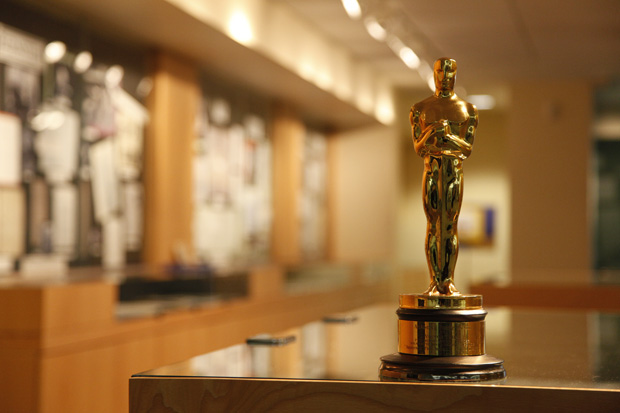Hollywood Reporter awards columnist Scott Feinberg ’08 prepares his winning picks for the Oscars
Brandeis alumnus gives inside look into Hollywood's big night
 Photo/Mike Lovett
Photo/Mike LovettScott Feinberg ’08 will attend the the 89th Academy Awards on Feb. 26 at the Dolby Theatre. It will be his seventh Oscars.
Feinberg, the awards columnist for The Hollywood Reporter, is tasked with evaluating movies at film festivals around the world in preparation for his highly-anticipated Oscars predictions. For Feinberg, the Academy Awards aren’t just the biggest stage for movies and their casts—it's when he finds out whether months of film-viewing and research translated into accurate picks for his readers.
BrandeisNOW sat down with Feinberg ahead of Hollywood’s big night.
BrandeisNOW: At the Oscars you’re a journalist in a crowd full of movie stars. What is that like?
Scott Feinberg: Witnessing the Oscars in-person is an experience. Everyone who enters the Dolby Theatre walks in on the red carpet. The theatre has a bunch of lobbies where you can mingle with people before the show and during commercial breaks.
I remember the first time I went in 2009, as a rookie reporter for the LA Times. My job was actually to stay in the room where they bring the Oscar winners as soon as they walk off stage. Since 2011, a year after I joined The Hollywood Reporter, I’ve had a seat in the theatre, where I tweet out analysis during the show. A few publications get a set number of seats and as a reporter you’re not in the very front with the nominees, but you’re mixed in with Academy members or others in the audience.
BNOW: Most people watch the Oscars at home. What’s it like in the theater?
SF: A big part of my job is to tell people what’s going on off-camera. I’m the eyes and ears for people not in the room. Sometimes the audience members just get into conversations or they’ll be on their phones, but other times interesting things happen.
Last year, after Lady Gaga performed a number on stage that involved dozens of sexual assault survivors, the show cut to commercial. So at home, you didn’t see that those survivors didn’t have seats in the auditorium and were escorted out of the theatre. As they came off the stage, they passed everyone in the front row and the actress Brie Larson—who plays a sexual assault survivor in the movie “Room”—got up and hugged every one of them.
It was a gesture done for no other reason than her own genuine kindness. It spoke to what kind of person Brie Larson is.
BNOW: Every year, you provide predictions. How do you go about preparing?
SF: I try to see every movie that’s been nominated. To get as many predictions correct as possible, you really do need to see everything.
BNOW: Do you find there’s an optimum way for you to watch a movie if you’re evaluating it as a potential Oscar winner?
SF: Most of the time I see them in screening rooms or at film festivals. I go to a ton each year, Telluride, Toronto, New York, Savannah, Santa Barbara and the list goes on. Sometimes I’ll watch them at home on a screener.
But, the ideal thing, from my point of view, is to see a movie on a big screen, in an environment where everyone else is equally serious about evaluating the film—with fellow lovers of film. You don’t want people checking phones or crunching on popcorn. So seeing a movie at a film festival is best.
BNOW: Are there any kind of rules you follow once it’s time to make a prediction?
SF: Each category is different, but there are rules, sort of. Some have asked, ‘Can you Nate Silver the Oscars?’ It’s tricky. The Academy, which does the voting, is 7,000 people—not a huge group—and they all have personal preferences and biases that no stats can account for. The human element is hard to quantify, so I talk to a lot of voters. At the same time, there are stats and conventions with regard to some of the categories that you can’t avoid. You also have to know how the voting itself works.
BNOW: What’s your success rate?
SF: In my best years, I’ve gotten 21 of 24 predictions correct. In a bad year, maybe 17 of 24.
BNOW: When can we expect you to make your picks?
SF: The voting period ends on Feb. 21 and I don’t like to lock myself in before then because anything can happen. I reserve the right to change my picks until the day of. Some years I feel great about them and other years I don’t. To consistently get a high tally, you need to know what you’re talking about.
BNOW: What’s it like watching the Oscars unfold and having your predictions stand up to reality?
SF: It’s a culmination of six months of obsessing, starting with the Telluride Festival over Labor Day weekend. It’s non-stop after that point. I love what I do and miss it once the Oscars are over, but on the other hand it’s exhausting.
It’s not saving the world, but the Oscars mean a lot to a lot of people. There’s a rich history. If you win an Oscar, you’re referred to as Oscar winner forever after. It’s the first line in your obituary. It’s a big deal. People are much more on the edge of their seats, and it’s much more emotional than any other awards ceremony.
BNOW: Is there a designer that’s going to outfit you?
SF: You and my mom will be interested to know that I’ll be wearing Paul Smith. It’s a navy blue tux with a black shawl.





